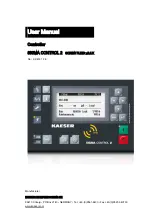
Descriptions of functions
10.4 Communication via PROFIBUS DP
SINAMICS DCM DC Converter
470
Operating Instructions, 12/2018, A5E34763375A
10.4.4.1
Setpoint assignment in the subscriber
Information about setpoints
●
Number of setpoint
When bus communication is being established, the master signals the slave the number
of setpoints (process data) to be transferred using the configuring telegram (ChkCfg).
●
Contents of the setpoints
The structure and contents of the data are determined using the local process data
configuration for the "SINAMICS slave".
●
Operation as "standard" slave
The drive unit (slave) only receives its setpoints as output data from the master.
●
Operation as subscriber
When a slave is operated as a subscriber, some of the setpoints are defined by one or
more publishers rather than by the master.
The slave is informed of the assignment via the parameterization and configuration
telegram when bus communication is being established.
10.4.4.2
Activating/parameterizing slave-to-slave communication
The "direct data exchange" function must be activated in the publishers as well as in the
subscribers, whereby only the subscriber is to be configured. The publisher is automatically
activated during bus startup.
Activation in the publisher
The master is informed abut which slaves are to be addressed as publishers with a modified
layer 2 function code (DXB req) via the configuration of the subscriber links.
The publisher then sends its input data not only to the master but also as a broadcast
telegram to all bus nodes.
These settings are made automatically using the bus configuration tool (e.g. HW Config).
Activation in the subscriber
The slave, which is to be used as subscriber, requires a filter table. The slave must know
which setpoints are received from the master and which are received from a publisher.
The filter table is created automatically via the bus configuration tool (e.g. HW Config).
The following diagram shows the information contained in the filter table.
















































